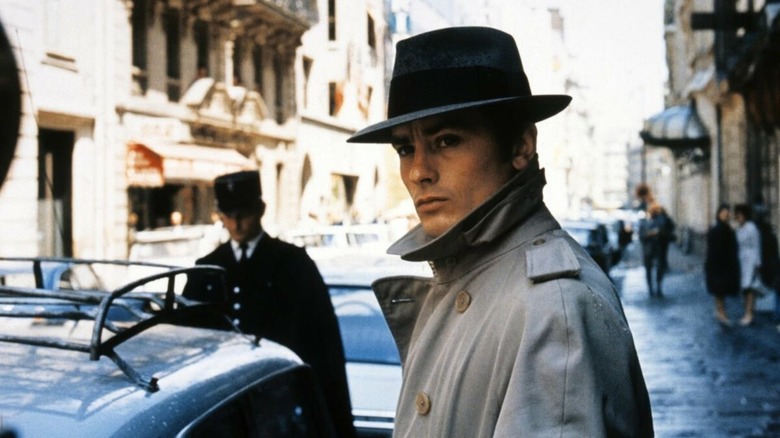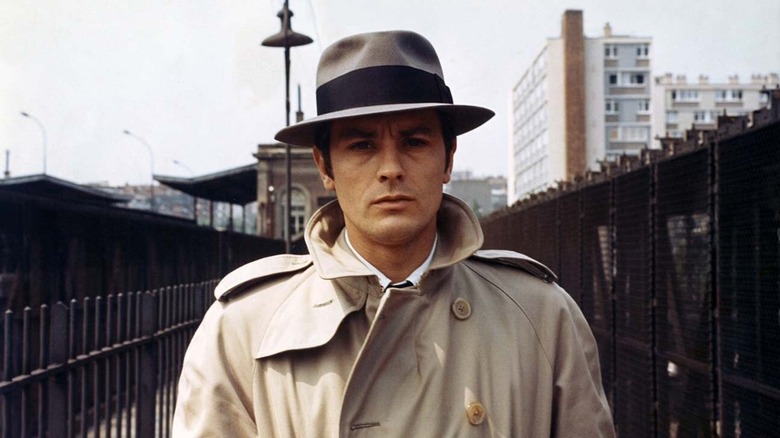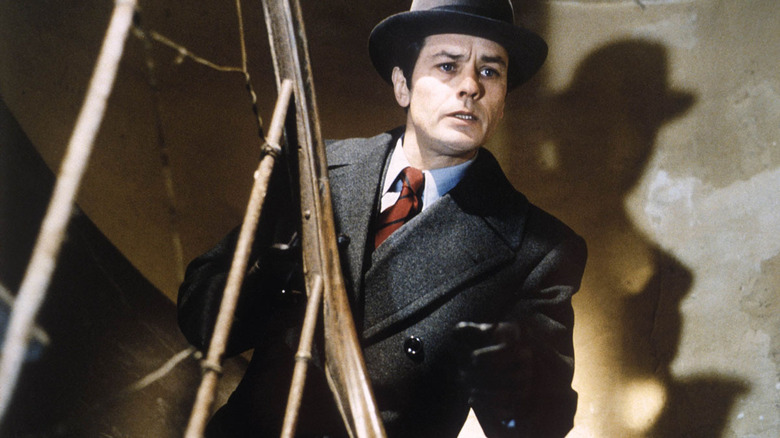There Are Only Two Perfect Alain Delon Movies, According To Rotten Tomatoes
The legendary, and legendarily handsome, international movie star Alain Delon passed away on Sunday, August 18, 2024. He was 88.
Delon was best known for playing heavies and tough guys, but he had incredible range, portraying all kinds of roles in his 60-plus-year career. Most American film students have experienced the bolt of electricity seeing Delon for the first time in an acclaimed international hit like René Clément's Tom Ripley adaptation "Purple Noon," or Luchino Visconti's "Rocco and his Brothers" (1960) or the same director's massive historical epic "The Leopard" (1963). Delon made several films with Clément (including "The Joy of Living," "The Joy House," and "Is Paris Burning?"), and was often paired with most of the best European directors of his generation, including Michelangelo Antonioni (he was in "L'Eclisse"), Louis Malle ("Spirits of the Dead"), Joseph Losey ("The Assassination of Trotsky"), Agnès Varda ("One Hundred and One Nights"), and even Jean-Luc Godard ("New Wave"). Anyone with a subscription to the Criterion Channel has likely seen several Alain Delon movies without even trying.
Perhaps most notably, Delon made three films with the undisputed master of film noir: Jean-Pierre Melville. Delon played the sexy-as-f*** Jef Costello in the hitman film "Le Samouraï." He also appeared in the 1960 crime film "Le Cercle Rouge" and the cop movie (and Melville's last) "Un Flic." One could argue that the French New Wave helped define the modern idea of cinematic "cool," and that Delon (along with Jean-Paul Belmondo) served as the concept's poster boys.
Curiously, only two of Delon's movies have 100% approval ratings on Rotten Tomatoes, and only one of those two was listed above. Even "The Leopard" has detractors.
Le Samouraï
Based on 40 reviews, "Le Samouraï" is deeply beloved by critics. Indeed, most of the essays you'll find posted on Rotten Tomatoes are from retrospectives and reassessments that find, even decades after the fact, "Le Samouraï" is smoky, suave, and amazing.
Roger Moore, writing for Movie Nation, pointed out that "Le Samouraï" pretty much invented a certain kind of assassination thriller, and indeed may be the single film to have turned "hitman" into a movie archetype. There have been countless films about professional assassins and hitmen, and most of them tend to depict the killers as ineffably cool and bottomlessly professional. "Le Samouraï" defined the trope, and Delon embodied it. Credit as well to the costume designers who put Delon in one of the best coat-and-hat combinations in film history.
Writing for the Washington Post, veteran film critic Kenneth Turan noted that Melville's film was austere and poetic, yet still managed to function as an exciting potboiler. It's weirdly mesmerizing, other critics have said, and yet thrilling the way a Hollywood thriller ought to be. Most critics have called attention to the way "Le Samouraï" influenced genre and pop filmmaking in general. Indeed, it's hard to be critical of such a seminal feature. Luckily, in addition to being influential, "Le Samouraï" is also amazing. Roger Ebert included it on his list of Great Movies, pointing out that the plot becomes more and more complicated without a viewer even necessarily noticing.
Mr. Klein
Keep in mind that a 100% approval rating only means that 100% of critics gave it a "pass" rating, and that many ratings for "Le Samouraï" rate it at a 3.5 or 4 out of 5. Several critics feel the film is a little too minimalist and spare for its own good. Indeed, it's not nearly as much fun as Melville's other noir films like "Bob la Flambeur" and "Le Doulos."
The other Alain Delon film with a 100% approval rating on Rotten Tomatoes, based on only 18 reviews, is Joseph Losey's 1976 WWII drama "Mr. Klein." Not as well known as Delon's work with Melville, "Mr. Klein" follows a well-to-do Catholic art dealer who is buying art collections from wealthy Jewish families as they are trying to flee Nazi-occupied France. Mr. Klein is helping the oppressed Jews, but attempts to remain "apolitical," a meaningless phrase during WWII. Mr. Klein, however, gets in trouble with the local Nazis when another man named Mr. Klein, a wealthy Jewish man that Delon has never met, begins forwarding his mail to him. The film swirls into a strange case of blended identities, and it becomes unclear which Klein is which.
Budd Wilkins, writing for Slant, described Losey's film as a mixture of heady wartime drama and bleak fable, using semi-fantastical elements to highlight the bleak nature of persecution. The amazing Peter Strick, writing for Sight & Sound, considered "Mr. Klein" to be "a wholly admirable work of art."
Both of the above films are available to watch on the Criterion Channel. You should watch them as soon as possible.
R.I.P. Alain Delon. You were the coolest.


